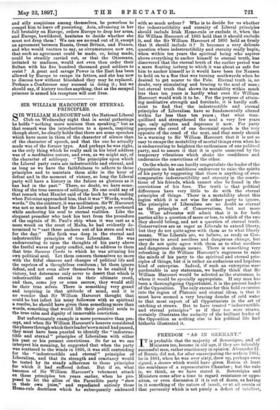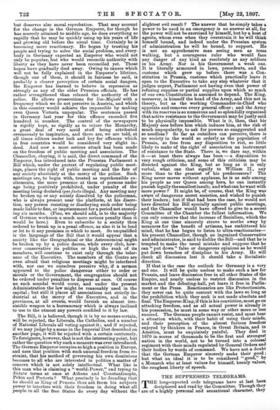FREEDOM " AS IN GERMANY."
IT is probable that the majority of Sovereigns, and of Ministers too, become in old age, if they are tolerably successful men, rather reactionary in opinion. Alexander II. of Russia did not, for after emancipating the serfs in 1861, he in 1881, when he was over sixty, drew up, perhaps even signed, a decree which would have given Russia at least the semblance of a representative Chamber ; but the rule is, we think, as we have stated it. Sovereigns and Ministers come after a time to regard resistance or oppo- sition, or even discussion if it is out of doors, as having in it something of the nature of insult, or at all events of that perversity which is not purely a defect of intellect, but deserves also moral reprobation. That may account for the change in the German Emperor, for though he has scarcely attained to middle age, he does everything so rapidly that he may be quickly using up his years of life and growing old before the usual time. Certainly he is becoming more reactionary. He began by trusting his people and trying to solve the social problem, and every- body in Germany expected an Emperor who would not only be popular, but who would reconcile authority with liberty as they have never been reconciled yet. Those hopes have gradually died away. Owing to causes which will not be fully explained in the Emperor's lifetime, though one of them, it should in fairness be said, is probably a clearer perception of certain social dangers, the Emperor has learned to believe in repression as strongly as any of the older Prussian officials. He has rather strengthened than relaxed the authority of the police. He allows prosecutions for Nse-Majeste with a frequency which we do not perceive in Austria, and which in this country would achieve the impossible by making even Queen Victoria unpopular. The sentences passed in Germany last year for this offence exceeded five hundred in number. The control of the newspapers is rigidly kept, so rigidly as to injure the Monarchy, a great deal of very acrid stuff being attributed erroneously to inspiration, and there are, we are told, at all times editors under lock and key for offences which in free countries would be considered very slight in- deed. And now a most serious attack has been made on the freedom of public meeting and association. The Chancellor, obeying, it is said, the direct command of the Emperor, has introduced into the Prussian Parliament a Bill which, under the pretext of regulating public meet- ings, places the right of public meeting and the fate of any society absolutely at the mercy of the police. Such meetings are, to begin with, treated as reprehensible ex- citements, the mere presence at them of persons under age being positively prohibited, under penalty of the meeting being declared ipso facto illegal. Any meeting may be broken up or any society dissolved by the policeman, who is always present near the platform, at his discre- tion, any person resisting or disobeying such order being made liable to fine, or imprisonment for a period not exceed- ing six months. (Fine, we should add, is to the majority of German workmen a much more serious penalty than it would be here.) Even to subscribe to a society thus ordered to break up is a penal offence, as also it is to lend or let to it any premises in which to meet. So unqualified is the language of the Bill that it would appear that a society like the Geographical or the Astronomical might be broken up by a police decree, while every club, how- ever conservative its politics or high the rank of its members, will continue to exist only through the toler- ance of the Executive. The members of the Centre are even afraid that religious meetings might be interfered with, nor can we ourselves perceive why, if a sermon appeared to the police dangerous either to order or morals or the Government, the congregation should not be ordered under penalties to disperse at once. Of course no such scandal would occur, and under the present Administration the law might be reasonably used in the capital ; but still it places all associations not strictly in- dustrial at the mercy of the Executive, and in the provinces, at all events, would furnish an almost irre- sistible weapon to a bureaucracy which is always inclined to use to the utmost any powers confided to it by law.
The Bill, it is believed, though it is by no means certain, will be rejected, the Liberals, the Catholics, and a number of National Liberals all voting against it ; and if rejected, if we may judge by a scene in the Imperial Diet described on another page, it will be rejected with a certain contumely. To foreigners, however, that is not the interesting point, but rather the question why such a measure was ever introduced. The German Emperor occupies so high a position in Europe, and uses that position with such unusual freedom from re- straint, that his method of governing his own dominions becomes to all who are interested in politics a matter of concern which is not solely intellectual. What like is this man who is claiming a " world-Power," and trying to dictate terms at once at Athens and Constantinople, Pekin and Pretoria ? What precisely is he dreading that he should as King of Prussia thus ask from his subjects power to interfere with their freedom in doing what all people in all the free States do every day without the slightest evil result ? The answer that he simply takes a power to be used in an emergency is no answer at all, for the power will not be exercised by himself, but by a host of agents, whom even when they overstrain it he will think himself bound, and indeed under the Prussian system of administration he will be bound, to support. He is not an apprehensive man seeing men as trees walking, but a courageous ruler who would face any danger of any kind as resolutely as any soldiers in his Army. Nor is his Government a weak one. It is literally armoured in laws, precedents, and the customs which grew up before there was a Con- stitution in Prussia, customs which practically leave it open to the Executive to take any step whatever that it judges urgent, Parliament not having even that power of refusing supplies or partial supplies upon which so much of our own Constitution is assumed to depend. The King, moreover, is himself the head of the Army, and this not in theory, but as the working Commander-in-Chief who appoints and removes every general officer ; and the Army with its reserves is so numerous and so splendidly organised that active resistance to the Government may be justly said to be physically impossible. What is it, then, that his Majesty sees before him which induces him, at the risk of much unpopularity, to ask for powers so exaggerated and so needless ? So far as outsiders can perceive, there is no society in the world so orderly as the population of Prussia, so free from any disposition to riot, so little likely to make of the right of association an instrument of resistance to the State. There is, we dare say, within it — at least there always has been — a disposition to very rough criticism, and some of this criticism may be directed against the King, but so long as it is only verbal, what can that signify to William II., any more than to the greatest of his predecessors? The King never moves without applause, he is as safe among his people as our Queen among hers, he can instantly punish legally the smallest insult; and what can he want with more power ? It might be, of course, that the King was aware of dangerous secret societies, and wished to punish their leaders ; but if that had been the case, he would not have directed his Bill specially against public meetings, and the Chancellor would have offered to give to a secret Committee of the Chamber the fullest information. We can only conceive that the increase of Socialism, which the King at one time sincerely strove to soothe away by measures for the benefit of artisans, has embittered his mind, that he has begun to listen to ultra-reactionaries- his present Chancellor, though an ingrained Conservative and administrator, is said to dislike the Bill—and that he is tempted to make the usual mistake and suppose that he can " put down" false or dangerous opinions as he would put down breaches of discipline in his Army. He will check all discussion lest it should take a Socialistic direction.
If that is the case the outlook for Germany is a very sad one. It will be quite useless to make such a law for Prussia, and leave discussion free in all other States of the Empire, and nearly useless to restrict discussion in the market and the debating-hall, yet leave it free in Parlia- ment or the Press. Reactionaries are like Protectionists, they never can be quite content with the laws so long as the prohibition which they seek is not made absolute and final. The Emperor-King,if this is his conviction, must go on attacking freedom, and as all actual power is already in his possession, he must in some way or other more or less succeed. The German people cannot resist, and must bear a situation which, with their habit of using their minds, and their perception of the almost furious freedom enjoyed by thinkers in France, in Great Britain, and in America, must be exquisitely painful. They died in 1870 in scores of thousands to be the first and strongest nation in the world, not to be turned into a colossal regiment with their minds regulated by General Orders and their bodies by words of command. We have not a doubt that the German Emperor sincerely seeks their good ; but what an ideal it is to be considered " good," by a Monarch who at least values for himself, keenly values, the roughest liberty of speech.







































 Previous page
Previous page